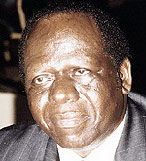




























|

|

|

|

|

|

|

|

|

|

|

|

|

|

|

|

|

|

|

|

|

|

|

|

|

|

|

|
|
|
|

|
|
|
MICHAEL KIJANA WAMALWA |
|

|
|
|
Michael Kijana Wamalwa, one of Kenya's most prominent leaders ventured into the Kenyan political scene in the 1970's eventhough it was not until the the early 1990's during the clamour for multi-party democracy in Kenya that he shot to the political centerstage. He was one of the so-called Young Turks, a group of second generation Kenyan leaders who characterized the popular Forum for The Restoration of Democracy(FORD) pressure group that later became a full-fledged political party. Other popular Young Turks included Raila Odinga, Paul Muite, James Orengo, Gitobu Imanyara just to mention but a few. Wamalwa grew particularly fond of veteran Kenyan politician and initial FORD frontrunner Jaramogi Oginga Odinga, who it became apparent was grooming the young Wamalwa to take over from him. After the original FORD party split into two, Wamalwa followed Jaramogi to FORD-K, where he served under him as one of the party's two national Vice-Chairmen. After Jaramogi's death in 1994, Wamalwa took over as the leader of FORD-K, but not after a tussle with Jaramogi's son Raila Odinga, who later decamped to form the National Development Party(NDP). Wamalwa, like Mwai Kibaki, has long suffered from being projected as an elitist and therefore out of touch with ordinary Kenyans.This is because he not only came from a priviledged family, but also had the luxury of a high quality education in the UK. He is as eloquent as it gets, and this combined with his rare mastery of the english language has made him the darling of media houses in Kenya. Its quite ironic that the elitist label that has dogged him and Kibaki for much of their political careers turned around and paid big-time dividends for them during the recently concluded 2002 Kenyan General Elections where Kibaki emerged as President, with Wamalwa as his Vice-President. Kibaki and Wamalwa are both beneficiaries of the political climate prevailing in Kenya during the run-up to the 2002 elections. Its clear that Kenyans across the board were very frustrated with outgoing President Moi's administration which they felt had failed to tackle the country's deep economic problems primarily as a result of incompetent leaders. Moi placed more emphasis on loyalty over ability and qualifications. Kenyans therefore went all out and voted in leaders they felt were capable of tackling the country's deep problems and putting the country back on proper footing. International response to Kenya's new crop of leaders has also been positive, with numerous pledges of resumption of the much needed foreign aid. There is no question that Kenyans and the international community have invested heavily on Kibaki and Wamalwa to turn the country around, and given the two leaders' track records, it would appear to be a very sound investment.
Michael Kijana Wamalwa was born in 1944 in the Kenyan farming town of Kitale in Rift Valley Province. His father Michael Wamalwa was a Senator both during the pre and post-independence Kenya. Wamalwa attended St. Joseph's Primary School and then proceeded to Chewoyet Secondary School. In 1963, he enrolled at Strathmore College in Nairobi for his A-levels after which he proceeded to the UK to pursue a Law Degree at King's College, Cambridge University in 1965. He obtained his Bachelor of Laws Degree from Cambridge in 1968 and then proceeded to the London School of Economics for his Masters of Law Degree that he obtained in 1969. He was then admitted to be a Barrister at the Linclon's Inn.
In 1970, after he returned to Kenya, he took up a job at the University of Nairobi as a Law Lecturer. During the 1970's, in addition to running his family's sprawling Kitale farm, he took up several high-profile appointments including the General Manager of the Kenya Stone Mining Company and Director of the Kenya-Japan Association. His debut into Kenyan politics can be traced to 1974 when he vied unsuccessfully for the Kitale West(now Saboti) Parliamentary seat. He finally captured the seat in 1979 and went on to score similar triumphs in 1983 and 1988. From 1983-1988 he was the KANU Parliamentary Secretary. He became a household name in the early 1990's during the clamour for multi-party democracy in Kenya. He was a member of the popular opposition FORD party that later split into FORD-A and FORD-K. Wamalwa followed Jaramogi to FORD-K and when Jaramogi died in 1994, he took over the party's leadership after a protracted tussle with Jaramogi's son Raila Odinga. Raila later decamped to form the National Development Party(NDP), that became defunct after merging with KANU during the run-up to the 2002 General Elections. Wamalwa contested the Presidency on a FORD-K ticket in 1997 and finished fourth with 505,704 total votes behind President Moi(KANU), Mwai Kibaki(DP), and Raila Odinga(NDP) respectively.
In the run-up to the 2002 General Elections, Wamalwa's FORD-K party merged with Kibaki's DP to form the National Alliance Party of Kenya(NAK), with Kibaki as Chairman and Wamalwa as Vice-Chairman. Then later when President Moi put his weight behind Uhuru Kenyatta as his preferred successor and KANU flagbearer for President, a group of rebel Members of Parliament, led by Raila Odinga and Professor George Saitoti formed a splinter group within KANU that came to be referred to as the Rainbow Alliance. The Rainbow Alliance members finally pulled out of KANU and formed the Liberal Democratic Party(LDP) which many still called the Rainbow Alliance. The LDP finally joined forces with Kibaki's NAK to form the
powerful National Rainbow Coalition(NARC) that swept away KANU during the recently concluded December 2002 General Elections. In a landslide victory, NARC leader Mwai Kibaki became Kenya's 3rd President with Wamalwa as his Vice-President.
|
|
|
Return to the Home Page |
|
|
Copyright©AfricanTribute.com Inc., 2002 |
|
|
|

|
|
|
|